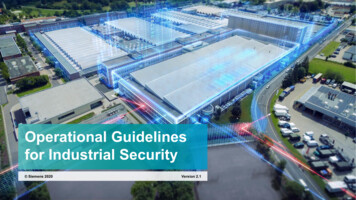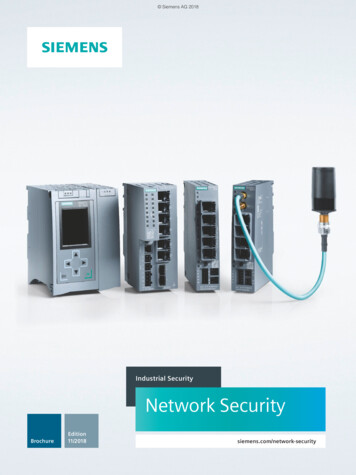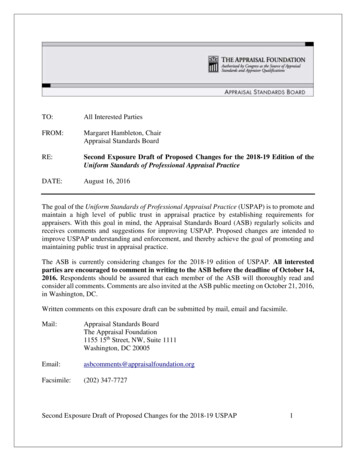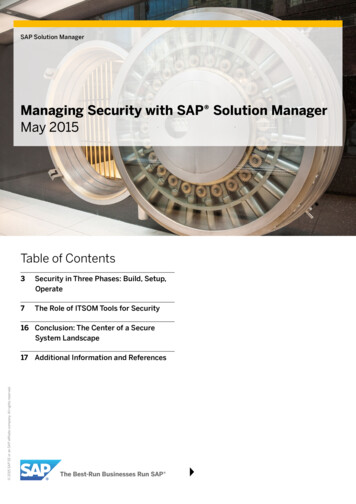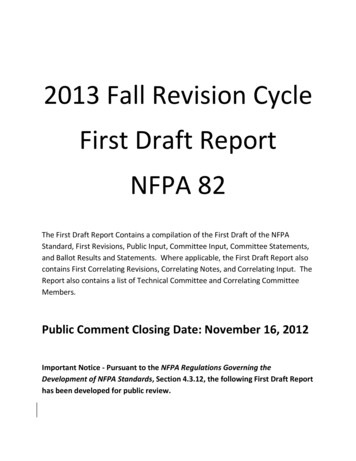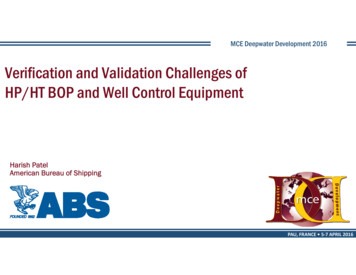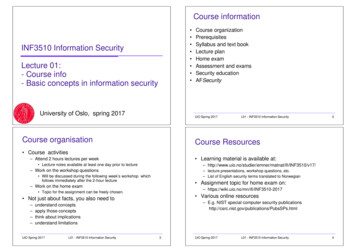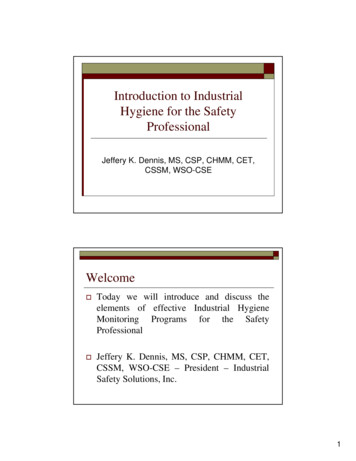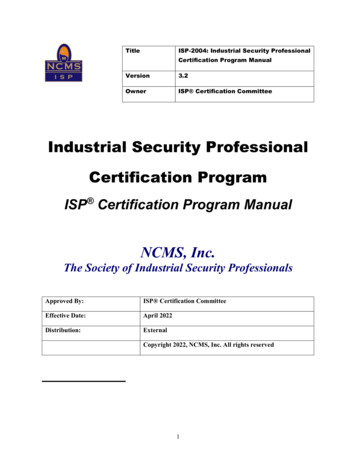
Transcription
TitleISP-2004: Industrial Security ProfessionalCertification Program ManualVersion3.2OwnerISP Certification CommitteeIndustrial Security ProfessionalCertification ProgramISP Certification Program ManualNCMS, Inc.The Society of Industrial Security ProfessionalsApproved By:ISP Certification CommitteeEffective Date:April 2022Distribution:ExternalCopyright 2022, NCMS, Inc. All rights reserved1
TABLE OF .Application12IV.Certification12V.ISP Certification Committee Organization13 1VI.Code of Ethics14VII.Recertification15VIII.Lifetime Certification17 2IX.Examination Facts19X.Study References and Sources22XI.Examination Maintenance and Security22XII.Examination Preparation Program2312Section added 3/12Section added 4/212
XIII.Appeals & Complaints Process23XIV.Self-Assessments and Audits25XV.Continuous Improvement and Corrective Actions26XVI.CEU Determination for Chapter Events28XVII. Contracts and Subcontracts29 3XVIII. ISP Logo and Mark30XIX.Accreditation Mark, Symbol, or Reference31RELATED PROGRAM DOCUMENTS (see Executive Director for materials)1.ISP Program History2.Document Control Policy3.Application Form (available online only at https://ncms-isp.org)4.Recertification Credit Guide5.Recertification Application Form6.CEU Review Subcommittee SOP7.CEU Calculations8.Security Plan9.ISP Certification Certificate3Section added 3/123
I.GENERALA. IntroductionNCMS created the Industrial Security Professional (ISP ) Certification because the Society saw aneed to focus specifically on the needs of the Industrial Security Professional, including theirgovernment counterparts. Other existing security-related professional certifications are notspecific enough to target the industrial security specialist who must follow the National IndustrialSecurity Program Operating Manual (NISPOM) and related government security requirementsrelative to the protection of government classified information.The ISP provides a recognized and reliable indication of knowledge, competency, andexperience of an Industrial Security Professional to apply Industrial Security programmanagement concepts, principles, and practices. The ISP is recognized as the standard ofexcellence for Industrial Security Professionals. The ISP was accredited by ANAB inSeptember 2013. 4B. Goals1. Improve professionalism within industry and government security.2. Enhance the recognition of experienced industry and government security professionals.3. Increase the recognition of NCMS as the premier security organization.C. PurposeThe purpose of the ISP certification program is two-fold:1. Provide recognition of the professional training and qualifications of experiencedpractitioners of industrial and government security. 52. Provide guidelines for maintaining up-to-date knowledge within the profession.D. Definitions (in the context of a certification) 61. Fair: Designed so that every applicant has and follows the same opportunity, rules, exam, andstandards.2. Impartial: Designed so that no outside or inside forces can skew the certification program inany fashion, particularly by granting favors to a particular person or group.3. Reliable: Designed so that the examination questions are accurate, and the results arerepeatable in a statistically verifiable manner.4. Relevant: Designed so that the examination questions are pertinent to the certification field;in this case an industrial security professional or cleared cyber security professional 7 with atleast 5 years of relevant experience.E. Eligibility1. Candidates must have at least five years cumulative experience in the industrial security field.NOTE: Military or police experience alone does not qualify; such service must includesubstantial industrial security experience within these professions to qualify for the five-yearexperience requirement. Each case will be determined based upon its merits. Finaldeterminations will be made by the ISP Certification Committee.Added 09/18 to comply with standard.Updated to remove “FSO-specific” reference; 04/206Section added 01/15 to comply with standard.7Updated to remove “FSO-specific” reference; 04/20454
2. Candidates must be working in industrial security at least part-time as part of their jobdescription (a minimum of 10% of their total workload) in order for the experience toqualify. 83. Candidates do not need to be currently working in industrial security to apply for the exam aslong as their work history satisfies the five-year minimum requirement. 9F. Certification Requirements 101. Candidates must provide a written recommendation from their supervisor. If a candidate doesnot have a supervisor, a member of the NCMS Board of Directors or an ISP in goodstanding may provide a recommendation. 112. Candidates must sign and submit a Candidate Confidentiality & Conflict of Interest (CCOI)agreement with their application. A candidate’s responsibility to abide by all terms of theCCOI does not expire regardless of exam results.3. Candidates must attain a minimum score of 75% on the ISP Certification Examination.4. Candidates who score a 75% or more on the exam must sign and return a CCOI for ISP sbefore their certification is finalized. An ISP ’s responsibility to abide by all terms of theCCOI does not expire even if the certification lapses.G. Examination Focus and Regulatory BasisThe examination focus is for security professionals who act as Facility Security Officers, or anequivalent, for facilities that protect classified government information and material. Thetechnical basis of the examination is the NISPOM and the requirements of related governmentsecurity programs.H. Examination Composition and Administration 121. The ISP Certification examination comprises 110 base questions covering eleven areas ofIndustrial Security Management (Security Administration and Management, DocumentSecurity, Information Systems Security, Physical Security, Personnel Security, InternationalSecurity, Classification, Security Education, Audits and Self-Assessments, Special SecurityInformation, and Security Systems 13). The examination is administered utilizing Prometric’sglobal network of test centers and is “open book”, with approved resource documentsavailable to candidates via a split screen during the exam. (Note: documents are approved bythe committee). 142. The rationale for using an open book examination is to replicate the office environmentwhere references are available and to encourage referencing current documents to ensure theenforcement of the current requirements. This method of examination thus discourages theimproper use of “memory” and “experience” and emphasizes referring to the correctrequirement documents because requirements change frequently. 153. The examination is two hours long and is designed so that the candidate will have time tolook up some, but not most, questions.4. The candidate may not consult with other individuals during the examination, nor may theyuse on-line resources.Clarification added; 11/15Eligibility changed per Board vote; 04/1510Revised to include candidate CCOI requirement; 09/1911Changed to allow an ISP to write recommendation per Board vote; 04/1512All references to hard copy exams removed per ISP Committee 8/12; elective categories removed 04/2013Exam section added; 04/2114Updated to reflect move to Prometric test centers; 12/1815Clarified by ISP Committee; 9/13895
5. Candidates may not write down questions and remove them from the examination room. Anyform of data mining/harvesting such as memorizing questions to give to others is forbidden. 166. References are listed on the ISP website (https://ncms-isp.org).7. The examination is available to approved candidates only and accessibility is dependent uponavailability at the individual test centers. Candidates schedule their test date and time directlywith Prometric. 178. The Executive Director administers the ISP Certification Program. Details are in theresponsibilities section of this policy.9. The designated ISP Certification Committee Co-Chair approves all applications and finalexamination results.I.Special Needs Candidates 181. ISP Certification candidates may request special consideration or accommodation by writingto the Executive Director, who will forward the request to the designated ISP CertificationCommittee Co-Chair for resolution. All requests for special consideration must include thespecific condition that requires the accommodation and a written doctor’s verification of thecondition creating the need for accommodation. 19 NCMS reserves the right to requestadditional documentation and/or verification if deemed necessary.2. Accommodations such as extra space for a wheelchair, large print examination, and extratime to complete the examination due to visual impairment may be made if the need isdocumented by the candidate with written verification by appropriate medical professional(s)as necessary. 203. All personal information furnished by the candidate and/or medical personnel shall beprotected in accordance with NCMS’ policy and practices regarding confidentiality (seesubsection U in this section). 214. If a candidate has special needs for the examination, then the ISP Certification CommitteeCo-Chair will determine what, if any, accommodations will be made. As a general rule allcandidates must comply with the requirements of the certification, answer the same numberof examination questions, and meet the same minimum score. The key is to balance thelegitimate needs for accommodation of the candidate with maintaining standards, fairness,and consistency of the certification and examination.5. Upon approval of request, Executive Director shall amend the candidate’s eligibility recordwith Prometric so they can prepare accordingly for the candidate’s test session.6. If a request is not approved, candidate shall have the option to appeal (see “Appeals &Complaints Process”). 22J. Proctors 23Effective September 2018, exams sessions moved to Prometric’s global network of test centers,thus eliminating the need for NCMS-approved proctors for individual exam sessions. However,NCMS reserves the right to administer a group exam session at any time, utilizing multipleproctors pre-approved from the ISP community, if it so chooses. 24Added by ISP Committee; 8/12Updated to reflect move to Prometric test centers; 12/1818Revised by ISP Committee; 2/1219Clarified by ISP Committee; 8/1220Revised by ISP Committee; 02/1821Added to address confidentiality; 12/1822Added to include the appeal provision; 12/1823Sub-section Title changed per ISP Committee; 8/1224Revised to document discontinuation of proctors with move to Prometric test centers; 12/1816176
K. Re-testing and Exam Retakes 25There are two categories of re-testing: re-test and retake by exception. A re-test occurs when thecandidate fails the examination and takes it again after fulfilling the designated wait period. Aretake by exception applies when there is a problem that prohibits the candidate from completingthe examination (i.e., losing internet connectivity), or a situation arises that compromises theexamination environment (i.e., a facility evacuation). Retakes by exception are reviewed on acase-by-case basis and are limited to only validated and approved anomalies beyond the controlof the candidate or test center.1. The following details apply to retake by exception: 26a) It is Prometric policy to get the test site back up and operational as soon as possible in theevent of an anomaly. However, if it determines that a candidate is unable to complete thetest due to circumstances beyond their control, a Center Problem Report (CPR) will befiled and sent to the Executive Director. Prometric will provide candidate with aCandidate Care card and told they will be contacted for a reschedule at no additionalcharge if approved by NCMS.b) Once the CPR is received, the Executive Director will forward to the designated ISP Certification Committee Co-Chair no later than the next business day for review.c) The designated Co-Chair will initiate a review to validate details and determine ifapproval of the retake is appropriate.d) The designated Co-Chair will advise the Executive Director of approval/non-approvalstatus no later than two business days following receipt of the request. If not approved,standard re-test procedures apply. The Executive Director will advise the candidate ofapproval/non-approval status within one business day of receiving the decision from thedesignated Co-Chair.e) If approved, the Executive Director will notify Prometric, who will then contact thecandidate to determine the earliest availability to retake the examination. If the candidatefails the retake, standard re-test procedures apply.f) MMCo will retain comprehensive records of all retake by exception requests.2. The following details apply to the re-test.a) Candidates who fail the ISP Certification examination may re-test after a period of sixmonths.b) Candidates must re-apply on-line at any time during or following the waiting period.Collateral materials are not required to be resubmitted unless job experience and/or thesupervisor has changed, or if the approval date for the original exam application wasmore than twelve months ago. 27 In either case, new materials will need to be submitted.c) Candidates who fail the test a second time will have to wait six additional months and reapply as if he or she were a new candidate, including the full fee.L. Cost 281. Cost of the ISP examination is 275 for NCMS members.2. Cost of the ISP examination is 400 for non-NCMS members.3. There is a 50 surcharge for international candidates.4. Cost of a re-test is 140 for NCMS members.5. Cost of a re-test is 200 for non-NCMS members.Clarification of “retake” vs. “retest” and processes for “retake” added by ISP Committee 1/14Retake policy updated to include specific timelines; 08/17. Updated to reflect policy with Prometric Test Centers;12/1827Clarification made on submission of new materials; 1/1528Costs revised 3/14 to reflect price increases.25267
M. History 29The ISP Certification Program was developed during 2001 through 2004 and became an officialNCMS program in June 2004. The ISP Certification Program was accredited by theANSI National Accreditation Board (ANAB) on 24 September 2013.N. NCMS Training 30NCMS training is developed and controlled by the NCMS Education & Training Committee,which is separate from the ISP Certification Committee. All NCMS training is for professionaldevelopment, not specifically to pass the ISP Certification Examination. The Exam PreparationProgram (EPP) is overseen by this committee. See section XI for details of this program.O. Firewall Between Training and ISP Certification Program 31The program requires that safeguards be in place to ensure that EPP facilitators and participantsdo not have access to the ISP examination questions, including any beta testing. Additionalsafeguards are also required to ensure that committee members who are responsible forgenerating and maintaining ISP examination questions are not involved in the EPP, in mentoringany potential candidates, or in any beta testing of exam questions. ISP Certification Committeeleadership maintains a roster of EPP Facilitators and the Exam Questions Subcommittee membersand the restrictions on participation for each to ensure this firewall is enforced. Volunteers arepermitted to participate in the EPP and ISP subcommittees other than the Exam QuestionsSubcommittee. Finally, all training must be kept separate from the ISP Certification Program.P. Document ControlProper document control of all ISP documents is maintained at all times following the ISP Document Control Policy.Q. Accreditation1. The ISP Certification Program was first accredited by ANAB on 24 September 2013 andwas valid for five years. ANAB requires annual surveillance be conducted of the program inorder to maintain accreditation. The ISP Certification Program accreditation identificationnumber is 0860 and is valid through September 24, 2023. 322. The ANAB accreditation program requirements are outlined in ANAB/ISO/IEC 17024 2ndEdition dated 2012 07-01, which is located on the ANAB website. 333. The accreditation program requirements provide standards that must be met, but they do NOTspecify how the standards must be met. The ISP Certification Committee and NCMSdetermine how to meet all standards.4. Annual reports to ANAB are required, and ANAB performs periodic reviews; allrequirements are stated in PCAC-CA-502, Manual of Operations for Accreditation, chapter 8.R. Accreditation Committee1. The Accreditation Committee is a committee authorized by the NCMS Policies andProcedures Manual, Section III, C.Section added per ISP Committee; 8/12Section added per ISP Committee; 8/1231Section added per ISP Committee; 8/12. Additional clarification regarding firewall added; 12/2032Revised to include required surveillance; 04/2033Updated 09/14 to list updated ANSI reference29308
2. The Chair of the Accreditation Committee is tasked with working closely with the ISP Certification Committee Co-Chairs to ensure that the ISP Certification Program remains incompliance with ANSI requirements.S. Impartiality 34The ISP Certification Program is dedicated to being completely impartial regarding candidateeligibility, as well as the examination, awarding of certifications, and recertification processes.T. Confidentiality 35NCMS shall hold all personally identifiable information (PII), business information, and othersuch information about candidates and ISP s in confidence and shall not disclose or publish anysuch information without prior written approval by the individual or affected party.In the event that NCMS becomes legally compelled (or if requested by an applicable regulatorybody) to release any information of an individual that was obtained through participation of theISP certification program, NCMS will provide the individual with prompt written notice, unlessproviding such notice would violate applicable law or regulation, so that the individual may seeka protective order or other appropriate remedy if desired. In the event that such a protective orderor other remedy is not obtained, NCMS will furnish only that portion of the information which islegally required (in the opinion of its legal counsel).II.RESPONSIBILITIESA. Board of Directors1. Under the direction of the President, oversees the ISP Certification Program, using the ISP Certification Co-Chairs 36 as the points of contact.2. Provides budget support and oversight.3. Reviews the program at least annually to ensure that it remains up-to-date, relevant, andimpartial organizationally and operationally.374. Approves major changes to the program, program budget, new standards, and newcertifications.5. Agrees to abide by all terms of the Board CCOI agreement, which is signed and submitted atthe beginning of the initial board term and/or appointment. 38 A board member’sresponsibility to abide by all terms of the agreement does not expire even after the end of theterm. 39B. ISP Certification Committee Co-Chairs 40Note: At the beginning of each board year, the co-chairs shall determine a beneficial assignmentof duties that will effectively support the ISP leadership committee and program. The co-chairsshall convey assignments to the Executive Director, the NCMS Board, and the ISP CertificationSubcommittees no later than the fall board meeting.Added per ISP Committee to address ANSI standard; 5/14Added per ISP Committee to address ANSI standard 7.3.4; 9/1836“Co-chairs” added to reflect change in committee structure; 09/1837Added by committee to address ANSI standard; 05/1438Requirement updated to reflect current practice; 04/2139Revised to include reference to required board CCOI agreement; 09/1940Updated to reflect change in committee structure and assignments; 09/1834359
1. Oversee and work with the Executive Director on the daily administration of the ISP Certification Program.2. Approve recommendations for eligibility of applicants/candidates. 413. Approve final examination results and awarding of the ISP Certification. 424. Approve final examination results for candidates who fail the exam. 435. Perform all ISP oversight duties outlined in the NCMS P&P Manual.6. Ensure that the ISP Certification Program is maintained in an up-to-date, relevant, andprofessional status, which includes an annual review of the ISP program, examinationquestions, and examination results; and a new Job Analysis (JA) every five years or uponpublication of a new NISPOM, whichever comes first. Details of how this is accomplishedare in the Examination Construction, Maintenance, and Administration Policy. 447. Report to the Board of Directors the status of the ISP Certification Program quarterly, toinclude recommended changes to the program at least annually.8. Recommend to the Board for approval any changes to standards or program, budget, and newcertifications.9. Oversee and approve annual self-assessments of the ISP Certification Program. Theseapprovals must be in writing. 4510. Oversee and approve all corrective action plans, continuous improvement activities, andquality improvement initiatives; verifies completion of all corrective actions; keeps records ofthese activities; and keeps the Board of Directors informed.11. Cooperate with the ISP Accreditation Committee as needed.12. Ensure that all ISP Candidates, ISP s, ISP Committee members, ISP Accreditationmembers 46, Board members, and contractors sign the appropriate Confidentiality and Conflictof Interest Statement.13. Monitor the work of all contractors supporting the ISP Certification Program.14. Conduct quarterly 47 ISP Certification Committee meetings and ensure that notes are takenand filed with the Executive Director.15. Publicize any changes to the ISP Program through all available means, including ChapterChair Liaison, Bulletin, ISP Webpage, and annual training seminar.16. Ensure that all rules and standards are enforced, to include maintenance of required records. 4817. Ensure that ISP Co-Chairs are properly trained by their predecessors to perform any tasksassigned to them.18. Work with Executive Director and examination contractor to ensure that examinationquestions are not being “harvested.” This includes using internet programs to determine ifinappropriate internet activity is indicating the compromise of examination questions. 4919. Conduct all inquiries/investigations into any security compromises or attempts to violateimpartiality and fairness of the program. 5020. Ensure that the ISP Certification Program is completely impartial in all of its actions, andthat organizational impartiality is maintained. 51Effective January 2011Effective January 201143Effective May 201244Added by ISP Committee; 2/1245Added by ISP Committee; 8/1246Added requirement for Accreditation Committee; 07/1847Revised by ISP Committee; 05/1748Revised by ISP Committee; 2/1249Added by ISP Committee; 8/1250Added by ISP Committee for clarification; 12/13; additional clarification 05/1451Added by ISP Committee to address ANSI standard; 05/14414210
21. Report any attempts to circumvent policies and procedures or to unduly influence or corruptthe process to the BoD President. 52C. Executive Director 531. Works closely with the ISP Certification Committee to ensure the program is properlyadministered.2. Follows the ISP Certification Program Manual.3. Maintains the official ISP Certification files, documents, and records. (See paragraph IV Bfor details.)4. Responsible for Document Control, which includes version control.5. Reviews applications, verifies the validity of information, and recommends eligibility to takethe ISP Examination. 546. Contacts candidates directly if applications are incomplete and maintains applications in apending file until material is received.7. Reviews candidate examination results and recommends granting of ISP Certification forthose who have a passing grade. 55 All test results are forwarded to the designated ISP CoChair for concurrence. 568. Provides notices for recertification.9. Supervises the contractor providing IT support for the on-line ISP examination.10. Provides proper security of all ISP files, records, examinations, seals, ISP pins, 57 andcertificates.11. Receives and reviews recertification applications, verifies the validity of information, andrecommends eligibility for recertification.5812. Consults with the designated ISP Certification Committee Co-Chair regarding any questionson an applicant’s eligibility to take the examination or whether or not claimed recertificationCEU credits are acceptable.13. Maintains the on-line test (vendor: Prometric), to include updating the test question bank,managing eligibility codes, and providing reports as necessary.14. Maintains master test bank, using a contract Test Writer/Editor as needed. 5915. Removes expired ISP s from on-line list.16. Trains and monitors the performance of all MMCO staff involved with the ISP CertificationProgram.17. Maintains proper records of the qualifications and training of all MMCO and NCMSmembers involved with the ISP Certification Program.18. Performs annual reviews and self-assessment of MMCO policies and performance related tothe ISP Certification Program.19. Ensures that the administration of the ISP Certification Program is performed in an impartialand fair manner by consistently enforcing all policies and procedures. 6020. Reports any attempts to circumvent policies and procedures or to unduly influence or corruptthe process to the ISP Certification and Accreditation Committee Chairs/Co-Chairs. 61Added by ISP Committee to address ANSI standard; 05/14Revised by ISP Committee; 2/1254Revised 1/11 to include eligibility recommendation55Revised 1/11 to include eligibility recommendation.56Effective May 201257Revised 8/12 to include seals and pins58Revised 1/11 to include eligibility recommendation59Clarified 8/1260Added by ISP Committee to address ANSI standard; 05/1461Added by ISP Committee to address ANSI standard; 05/14525311
21. Attends committee telecom meetings as needed. 62D. Accreditation Committee Chair1. Works with ANAB to establish and maintain accreditation.2. Coordinates with the ISP Committee Co-Chairs and Executive Director to ensure the ISP Certification Program maintains accredited status.3. Reports to the Board of Directors quarterly regarding the status of accreditation.E. ISP Recipients 631. Comply with the NCMS and ISP Codes of Ethics (in P&P Manual and ISP Manual,Section VI respectively).2. Maintain certification every three years following established requirements in Section VII.3. Maintain confidentiality of any sensitive or private information related to the program.4. Fully disclose any real or potential conflicts of interest in accordance with policy.5. Refrain from making any misrepresentations or claims regarding certification outside thescope for which the certification has been granted.6. Refrain from altering the ISP certificate or using it any such manner as to misrepresent theindividual and his/her qualifications as an ISP .7. Report to NCMS HQ when the individual is no longer able to meet the requirements of beingan ISP .8. Report to NCMS HQ when the individual completely retires from performing industrialsecurity.III.APPLICATIONThe application is only available on-line and can be viewed from the ISP website (ncmsisp.org). 64IV.CERTIFICATIONA. DecisionThe decision to certify a candidate for the ISP is made by the designated ISP CertificationCommittee Co-Chair based upon the recommendation of the Executive Director, whose input isbased upon the candidate passing the on-line examination and having completed alladministrative requirements. 65B. RecordsThe Executive Director will keep records of all certifications, re-certifications, and examinationresults in accordance with NCMS’ record retention policy.1. Certifications.a) Names of ISP with dates of certificationb) Copies of applications2. Re-certificationsAdded by ISP Committee; 02/18Added 4/14 to address ANSI standard. Updated 9/18 to comply with standard.64Revised to remove hard copy application reference; 01/1565Revised to remove hard copy exam reference; 8/12626312
a) List of ISP s with dates of recertification and appropriate noticesb) Copies of applicationsc) Names of re-certified ISP with dates of re-certification3. Examinationsa) Copies of applicationsb) Copies of examination results, to include names, scores, and average scoresc) Copies of examination analysisV.ISP CERTIFICATION COMMITTEE ORGANIZATION 66A. General.1. The ISP Certification Committee is composed of an Executive Committee andSubcommittees. Although the Examination Preparation Program (EPP) is not part of theISP Certification Committee, it is listed on the ISP website in order to maintain a cohesiveorder for ISP candidates.2. All committee members other than the co-chairs may be volunteers, from within or outside ofNCMS, who are current ISP s.3. All committee members are required to sign and submit an ISP Committee CCOI at thebeginning of each term to be served. A committee member’s responsibility to abide by allterms of the agreement does not expire even after the end of the term. 674. The ISP Co-Chairs approve all recommendations from the subcommittees. See“Responsibilities” (P&P Manual, Section II, paragraph B, # 11) for details of the ISP CoChair duties.5. Subcommittee Chairs will keep the ISP Co-Chairs appraised of their activities and submitrecommendations to the ISP Co-Chairs.B. ISP Certification Executive Committee 68ISP Certification Executive Committee consists of the ISP Certification Committee Co-Chairs,Certification Subcommittee Chair & Vice Chair, Exam Questions Subcommittee Chair & ViceChair 6
) Certification because the Society saw a need to focus specifically on the needs of the Industrial Security Professional, including their government counterparts. Other existing security- related professional certifications are not specific enough to target the industrial security
